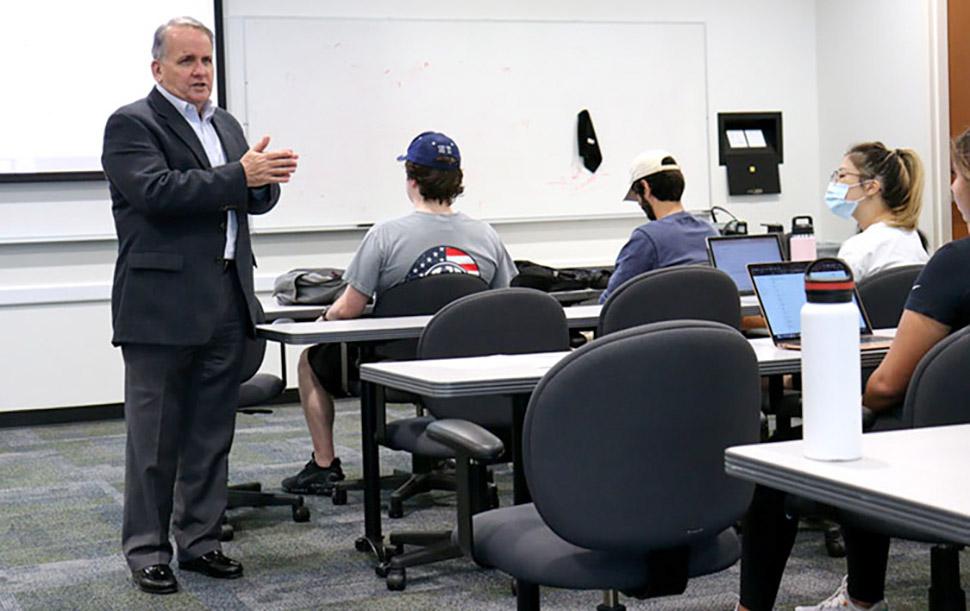The Naveen Jindal School of Management at the University of Texas at Dallas has formed a new center that aims to become a hub of connections between students and faculty and the retail industry.
Called the Center for Retail Innovation and Strategy Excellence—or RISE—the program aims to be at the forefront of the digital transformation evolution that retail is poised to experience.
UT Dallas leadership wants to take advantage of the unprecedented disruption ahead. As a Tier One research institution, a status that UTD earned in 2018, the university is readily equipped with the resources needed to collaborate with major players in the space.
“We’re already creating the knowledge that will help us partner with the retail industry,” Charles Haseman, RISE’s director, said. “We can use that thought leadership to guide retailers in solving their challenges by collaborating with them on research, education and practice.”
That connection will mainly focus on those closest to home.
A hub of engagement
RISE defines itself as a “hub of engagement for the DFW regional retail industry and the Jindal School.” Dallas-Fort Worth, lauded as the “headquarters of headquarters,” is already home to a number of retail corporations and other companies that serve the industry.
For UTD students in marketing, operations management, and information systems areas, engagement with the local retail scene is vital. RISE wants to be the “focal point” for this.
Faculty and student engagement is based on six pillars:
• Work with leading-edge faculty on retail-related research,
• Industry-funded research projects,
• Lecture series,
• Capstone projects for graduate and undergraduate classes,
• Case study competitions, and
• Internships.
RISE will collaborate with local companies, nonprofits, and multinationals that have set up shop in the region. Partners will sponsor events, undergraduate and graduate student projects, and competitions, while also funding internships and working on research projects with students and faculty. Leadership also hopes students will become part of their future workforces.

Charles Haseman, a professor of practice in marketing and director of the Center for Retail Innovation and Strategy Excellence [Photo: UTD]
Shifting perceptions
But RISE’s first job, according to Haseman, is to “shift consumer perceptions.”
“For many people, the first thing that comes to mind when they think of retail is a brick-and-mortar giant like Walmart or, for e-commerce, Amazon,” he said. “For me, it’s the customer experience.”
Haseman, who is also a professor of practice in marketing, hopes RISE will become the “the back office” of retail. That mindset will allow the center to assist the industry in implementing best practices that could improve CX. A large part of that is an omni-channel approach.
“The consumer doesn’t care what’s behind the curtain,” according to Haseman. Customers want a memorable experience.
To do so, he thinks companies have to shift their focus to behind-the-scenes technology and data manipulation. Because, to Haseman, that’s what has made retail what it is today.
“Whether it’s catalogs, brick and mortar, e-commerce or direct-to-consumer delivery, if a company doesn’t have all of these on their pallet, they’re not going to survive,” he said. “The customer experience has to be outstanding on all those fronts.”
‘Very real’ aspects of retail
Haseman sees UTD already as already having those strengths. Data management and analysis, computer science, cryptocurrency, and other emerging technologies—”very real” aspects of retail—are already present within the halls of the university.
Dr. B.P.S. Murthi, director of the Morris Hite Center; Dr. Özalp Özer, the George and Fonsa Brody Professor in management; and Dr. Nanda Kumar, a professor of marketing, are all lead researchers who will be involved with RISE.
The center also has an advisory board. It includes Ray Hemmig, chairman of the board of Retail and Restaurant Growth Capital and a retail veteran. Hemmig is a past chairman of, and continues to serve on, the Jindal School Advisory Council.
Haseman plans to integrate with additional faculty across various university disciplines as well: global supply chain, marketing analytics, e-commerce, pricing management, channel strategies, customer lifetime value, information systems, and mobile technology.
Preparation, partnership, and process
Overall though, RISE will be based on what Haseman refers to as the ‘three P’s: Preparation, partnership, and process.
“Preparation—that’s getting the students ready. Partnership—that’s the corporations all across the world that we want to work with. Process—that’s where the researchers come in,” he said.
At its peak, RISE hopes to pioneer retail corporate response to disruptive technologies and digital transformation, which the center sees as “twin challenges.”
“Today, new value can be unlocked by changing strategies or by restructuring operations or business systems,” RISE notes on its website. “If corporate responses prove inadequate in the challenging environment, retail corporate boards, activist investors or private equity funds are likely to move in to force change.”
![]()
Get on the list.
Dallas Innovates, every day.
Sign up to keep your eye on what’s new and next in Dallas-Fort Worth, every day.

































































